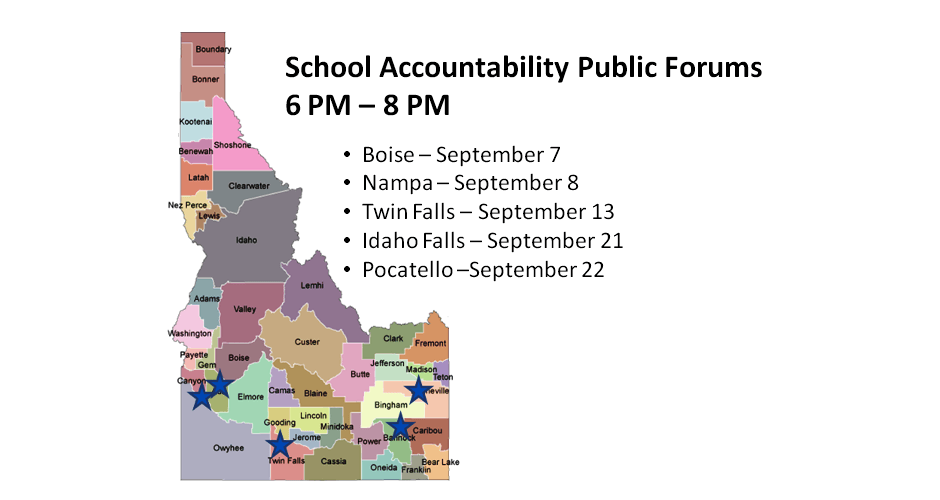These meetings are not well publicized – They hope you won’t attend.
If You Want a Say in Your Child’s Education You Must Attend!
Our thanks to Mary Ollie for putting this information together
As citizens we all have a basic civic duty to follow the law. However we also have a civic responsibility to participate. By not participating we allow others to make decisions for us.
Idahoans have an opportunity to participate in shaping Idaho’s education policies when the State Board of Education holds public forums in September. When the Every Student Succeeds Act (ESSA) became law in December 2015, it caused a ripple of changes from the US Department of Education to the states to local school districts. As one teacher said, “ESSA is not what we wanted, but it is what we have to work with right now. We can either shape it…or let it shape us.”
Hearings are scheduled from 6 PM to 8 PM for the following dates and locations:
| Date | City | Address |
| Sept. 7 | Boise | School District Office, 8169 W. Victory Road |
| Sept. 8 | Nampa-Caldwell | Ridgevue High School, college lecture hall Room 190, 118800 Madison Road |
| Sept. 13 | Twin Falls | College of Southern Idaho, Shields Academic Building, Room 118 |
| Sept. 21 | Idaho Falls | Eastern Idaho Technical College, Health Care Education Building, Room 6164, 1600 South 25th East |
| Sept. 22 | Pocatello | Idaho State University, Pond Student Union, Middle/South Fork rooms |
As of this writing no public forums have been scheduled for north Idaho. The State Board of Education website lists Alison Henken (208-332-1579) as the K-12 Accountability and Projects Program Manager. For readers wanting to know more about activities and meetings on education, the State Department of Education maintains a calendar.
Background on ESSA:
ESSA replaced No Child Left Behind (NCLB). It is no exaggeration to say that ESSA remains controversial and has left many unhappy. But the fact remains that for now it is the law. Organizations including the National Education Association and the Network for Public Education soundly criticized NCLB for its emphasis on high stakes testing and have encouraged public input to ensure that ESSA moves away from the worst features of NCLB.
When ESSA was being debated, much input focused on eliminating high stakes testing, protecting student privacy, and policies that support rather than punish schools. It was hoped that responsibility for student achievement would be returned to states, school districts, and parents.
Concerns about ESSA found across the political spectrum.
The Network for Public Education expressed several concerns and among these were; States should be able to exercise their right to determine what measures should be taken if students opt, free of federal intrusion, and the US Department of Education should allow states to retain the authority given to them by ESSA to create their own rating systems (for schools), and to determine their own weighting of various factors. The federal government should be prevented from requiring that schools be labeled with a single grade, just because that happens to be its own policy preference.
Truth in American Education a conservative blog raises similar issues in “Top 12 concerns about the Every Student Succeeds Act (ESEA reauthorization)” Among these are parental rights, erosion of state power over education, profiting by private corporations, erosion of local control, and data privacy.
Across the political spectrum consensus is building that control of education needs to be taken out of the hands of Politicians and Edu-Profiteers and given back to teachers, schools, parents, and communities.
Our civic responsibility.
Who controls education? If you follow the Constitution, you know it is “We the people” who exercise control. We can and should fulfill our civic responsibility by participating in the public forums held by the State Board of Education.
The state board is an agency with rule-making power. The Accountability Oversight Committee was established by the board earlier this year to make recommendations on a new accountability framework for Idaho public schools that will meet not only federal school accountability requirements but also create an accountability framework to meet the needs of Idaho. Background on the state board’s accountability oversight committee can be found in this 13 page PowerPoint Presentation
If Idahoans’ interests are similar to those of parents and teachers across the nation it is likely issues identified by the National Education Association, the Network for Public Education, and Truth in American Education will come to the forefront. These will include questions on high stakes testing, on parental rights, data collection, school rating systems, and local control. Some of these concerns and the board’s possible direction have been reported on by Idaho Education News.


